People throw the word ‘scale’ around as if is the only objective of every business that has gained any traction but the truth is that most entities will not scale, and many were never meant to in the first place. Then, every once in a while, there is a unicorn storefront concept that seemingly shouldn’t scale (because of the internet) but then does. Today, we’re going to learn that proximity and speed are key factors when it comes to repairing the most important devices we all have.
If you haven’t heard about uBreakiFix then you will today and if you live in the USA and haven’t seen a store yet, chances are you will very soon. Especially those of you that tend to fumble your devices. I’m looking at you, Mr. Living On The Edge With No Phone Case.
It all started when Justin Wetherill, CEO and CoFounder of uBreakiFix, dropped his iPhone 3G and damaged it in 2009. He had a frustrating time trying to get it fixed and, after being quoted $200 by the Apple store, he decided to give it a shot himself. Then, he decided to launch a home business that fixes phones for other people. Hello, step into my repair shop, errrr living room. After teaming up with his friend David Reiff, and then Eddie Trujillo, they opened up a brick-and-mortar location. What happened next is amazing to me: 10 more locations the next year. That’s some mind-numbing speed.
Admittedly, in the name of brevity, I just truncated their entire founding story into 1 paragraph, which certainly doesn’t do it justice given the blood, sweat, and tears that I know goes into getting a business off the ground. It’s truly special what Justin has been able to accomplish as CEO. I’m sure it’s been a blur, but I hope that he, David, and Eddie are able to have an occasional shot together and reflect on how special this ride has been. Even more amazing, when I sat with Justin I detected no ego, all humility. Take notes, megalomaniacs! Let’s find out a bit more …
[Setting: We met at uBreakiFix’s beautiful & hip downtown Orlando office in the morning. My photographer, Nick, met me at the lobby and we then proceeded to snap some pictures and head downstairs to the SunTrust building courtyard to enjoy the weather & chat for a bit …]
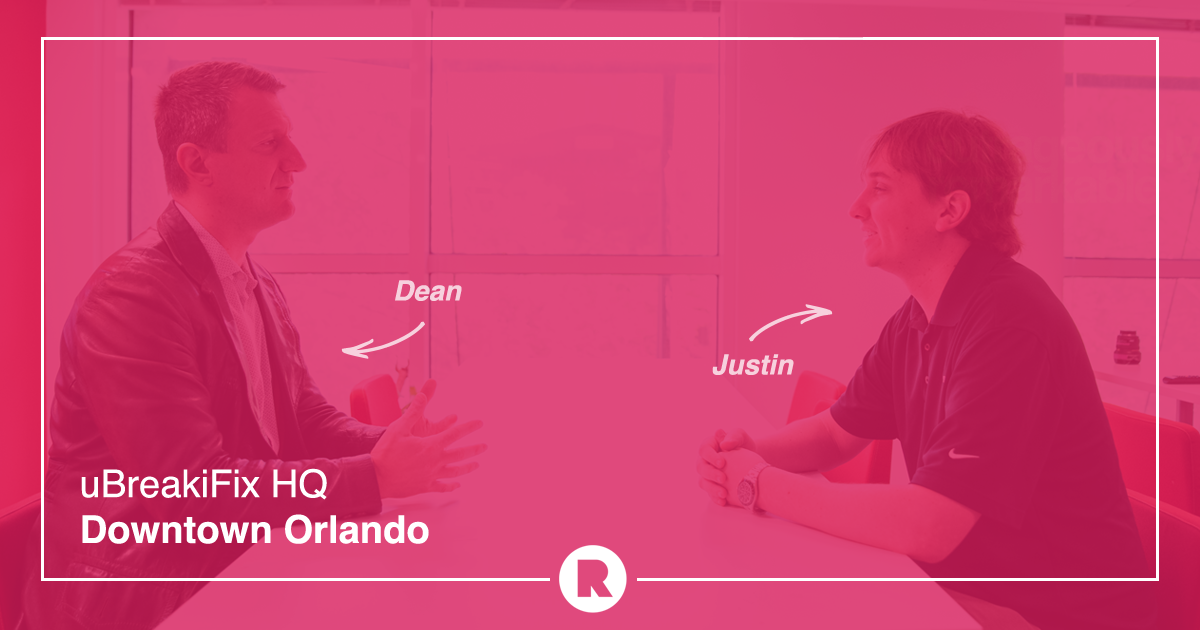
Dean: Okay Justin, riding this wave of growth, what is the coolest thing that you get to do [at uBreakiFix]?
Justin: To be a part of it. You know, it’s been a humbling and really rewarding experience for us the last nine or ten years here and I feel super blessed just to be a part of it. To lead the team we’ve been able to put together. Growing this thing from my bedroom to now 406 stores today has been absolutely an incredible ride. Happy to be a part of it.
Dean: Is there some part of your job function that really gets you excited in the morning? You mentioned to me that you were going to Kansas City and other places that are opening up locations. Do you enjoy the travel and the human interaction part? Or is there something else that excites you?
Justin: Yeah so a lot of people talk about what their ‘why’ is and why they do what they do. For me, what gets me really excited about this business is being able to share what it has been for me with others. Like I mentioned, it’s been a huge blessing to me, both through the relationships I’ve built and financially. For me, what gets me out of bed every morning is being able to share that with as many people as possible whether that be employees, or franchisees, or even employees of franchisees. I think that we’ve been able to create a really great opportunity and spreading that is what gets me out of bed every morning.
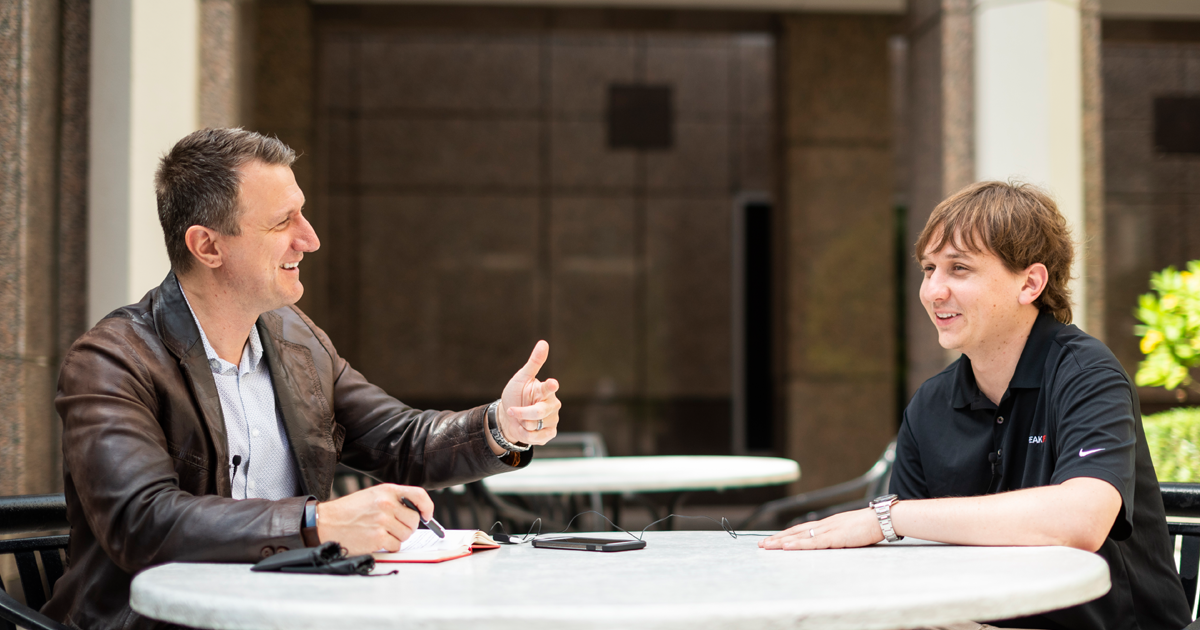
Dean: Going back, at what point did you realize that this was going to be more than one store and this is something that can be replicable? Was that the plan going in or was there a moment in time where you guys were on store number one and had a breakthrough?
Then, we opened I think nine or ten stores that next year.
Justin: When we started the business, we launched as a website and then Eddie convinced us to do a store.
Dean: So it was a website first.
Justin: Yeah, the website was first and the website served the entire country. Eddie convinced us to open a store and it was 500 square feet, $800 a month on Goldenrod. The second month that store was open, it eclipsed the sales of the website that served the whole country. That was kind of like the lightbulb moment, like if this hole in the wall shop could do more sales than the entire country, then people weren’t willing to wait to have things fixed. At the end of the third month, I quit my career, my full-time job that I got coming out of school, and moved to South Florida where I was from to open our second store in December. We opened our first store in September 2009 and I moved to South Florida and opened our second store in December 2009, so it was a really quick transition from one to two. Then, we opened I think nine or ten stores that next year.
Dean: I guess the reason you pivoted to the store was the reduction in wait time for consumers that you mentioned?
Justin: Yeah, it was the performance of that individual store versus the website. In 2009, when we started to do this business, people were just starting to do things outside of text messaging and talking on the phone on their phone. It was we were kind of at the tipping point where the phone went from being just that to being your GPS, your internet browser, your camera … we got to witness that firsthand and that’s a lot of what influenced us and encouraged us that people weren’t going to be willing to wait because it was playing such an important piece in their everyday life.
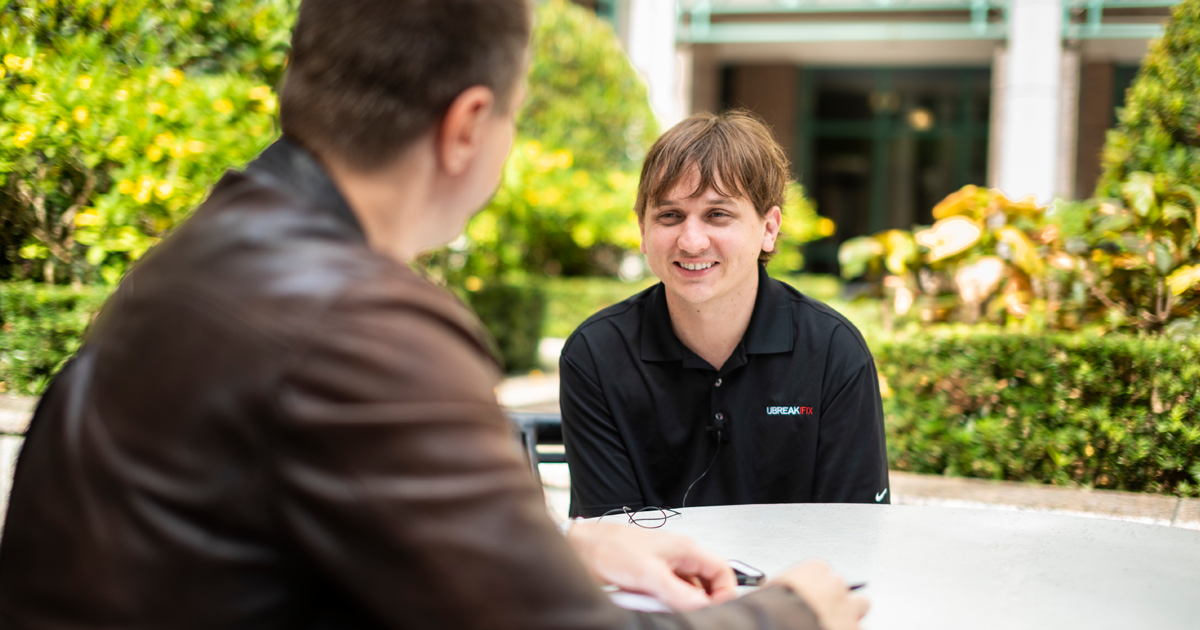
Dean: I was reading in Entrepreneur Magazine that your team has been rated the #1 franchise for consumer electronics, which is a pretty awesome thing to read, I’m sure. Are there any core philosophies that you would attribute that success to being able to get that status?
Justin: I think at the end of the day, running a business that we’re proud of, making the right decisions over an extended period of time that aren’t only better for the bottom line, but are better for the people that are part of the business and our partners, etc… have continued to put us in a unique position in the industry. I think that a lot of times, people think that business is all about money and the reality is that we’re growing something special here and it’s not all about the money. It’s about making all of our partners and stakeholders proud to be either working with us or a part of what we’re doing.
… it would take a heck of a lot to get us out of Orlando.
Dean: You mentioned that you hired your friends when you first started and just now, you mentioned taking care of the stakeholders. It sounds like loyalty is a big core value. Would you say so?
Justin: Loyalty is huge for us. I think the founders of the business realized pretty early on that it wouldn’t be any fun to get rich alone and we’ve really kind of worked for the past eight years to ensure that it wasn’t the case. We could have sold out and we could have moved on and I could be on a beach right now, but what’s more important than the money to us is what effect it has on everybody who has helped us get to where we are.
Dean: Do you envision the headquarters staying in Orlando?
Justin: Yeah, yeah, we really like Orlando. We are going to be making a move in the next year, but it would take a heck of a lot to get us out of Orlando. We really like the business culture here and it’s just been a great city for growing a business.
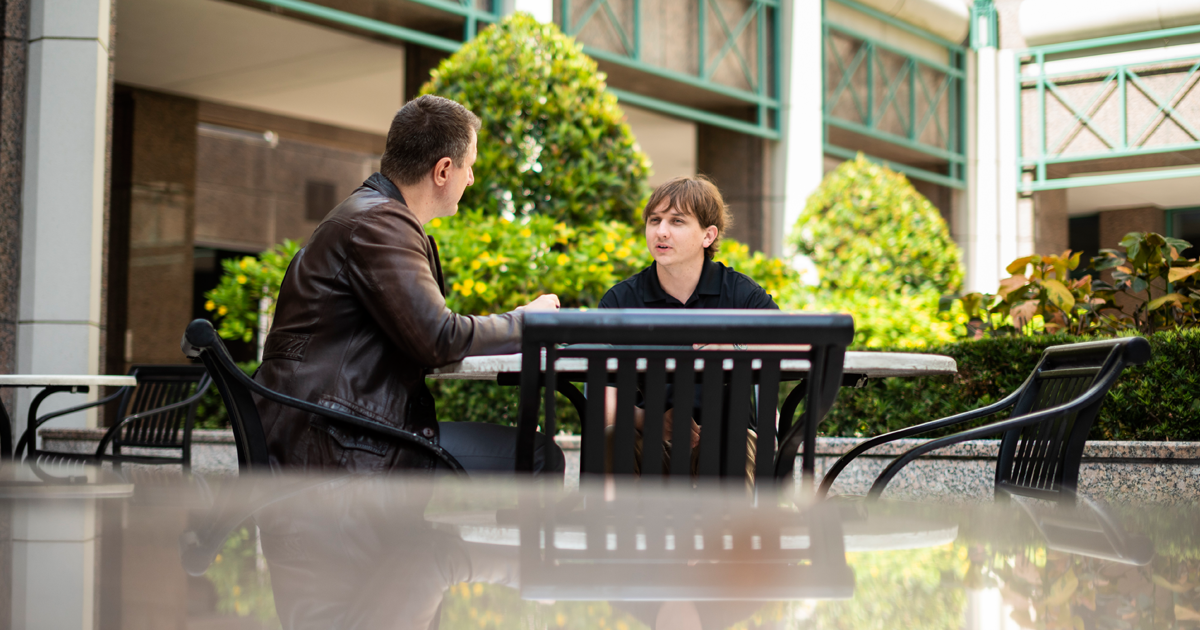
Dean: Alright, let’s say that there’s another entrepreneur and they’re getting ready to build their own prototype store. Is there any advice that you would give them about building a prototype store? In any industry.
My brother, my dad, my friends … we were on the front line …
Justin: In any industry? I think at the end of the day, at the risk of sounding like Jeff Bezos of Amazon, really focus on your customer. What is going to differentiate you from others? What is your value? What are you selling? What would you be willing to pay for it? Put yourself in the customer’s shoes as you’re designing that experience and make sure you are designing a customer first experience because at the end of the day, you look at retail bankruptcies from 2016-2018 and you’ve got the Radio Shacks and the Toys’R’Us’ of the world that are highly recognizable, but not being able to be successful anymore. What you quickly realize is that the retailers that aren’t seeing the success that they used to, when you think about your experience in those stores, they’re not very memorable. Yeah, you went there because they had something you needed, but nothing was bringing you back because you wanted to be there. It was just going to fill that need.
Dean: How did you, early on, get customer feedback? I know probably in the first store, you were able to get it firsthand, but as you’ve grown, what’s your best way to get customer feedback? Do you get it through your partners, do you have some other method of getting it from end users?
Justin: Like you said, when we started we were in the first 47 stores. My brother, my dad, my friends … we were on the front line and we had a really good feeling for the experience we were delivering in the stores. As we’ve grown, that’s matured a lot. We collect feedback through email surveys and text message surveys post-repair. The text message surveys are really popular for us. Most people get their phones fixed at our stores, so if you shoot their phone a quick text message while they’re walking out and ask one simple question, we tend to get a pretty good response rate on that. It’s hard for us to find a balance between not bothering our customers with too much follow-up stuff and making sure that we’re delivering on our promises to them, but I think we found a good balance and the text message play has been really strong for that. Also, all of our partners, whether it be Samsung or Google or whatever, collect feedback from our mutual customers as well, so we’re constantly being held accountable through that.

Dean: That’s awesome. So, I’m imagining that culture and building the right culture has been a part of your growth. How would you describe your current culture and how do you feel that it has evolved since the beginning?
Justin: I think if you walked around our office … I think humble would be a good way to describe our culture. All of us involved are really encouraged by how we’ve been able to position uBreakiFix in the industry and are excited to be a part of it, but you know, a lot of us kind of still pinch ourselves when we wake up in the morning and wonder what we did to deserve having the opportunities that we have.
… it all felt really natural.
Dean: Just getting to 47 stores, there has to be a bit of audacity in there to be able to go, you know, we can just grow this quickly. Is that from confidence? You mentioned when we talked earlier that it was very organic, but there had to be a bit of boldness in there I think?
Justin: I don’t think the two are mutually exclusive. I think that you can show humility, but still be confident in your abilities or in the model’s abilities. I’m certainly a big risk taker if you talk to anybody who knows me, they would vouch for that. With great risk comes great reward, so when we saw the success of these stores early on, it seems like it might have been a risk, but it all felt really natural. We weren’t having some stores do good and some stores do bad, we were seeing a lot of success and we were keeping our heads down, working hard, and trying to capitalize on it as quickly as possible.

Dean: I was reading online an interview that you did and you mentioned in that interview that the best piece of advice that you received from a mentor was to begin with the end in mind and to work backward to that goal. I think the example used was that we want to grow to this many stores, so what do we need? We need recruiters, etc… What’s the end in mind that you have right now and what are you working backward towards?
Justin: For us, we started this business in my bedroom, kind of in the wild wild west. Kind of over the last nine years or so now we’ve been able to string together some of the biggest partners in the industry and grow our footprint substantially. A lot of what the end looks like for us is just continuing to do that. Opening more stores, bringing in more partners, delivering a differentiated experience to more customers, exiting the business, things like that, not something that gets talked about for more than one hour a year. We’re all really encouraged and proud of where we’re at right now and the end for us is working really hard and trying to make a better experience for our customers. I think, frankly, in the battle in kind of repair versus replacement, we’ve still just scratched the surface. I think we’re really proud of what we’ve accomplished, but we all feel like we’re just getting started.
… how much volume can you push through 1000 square feet?
Dean: Do you have a number [of stores] in mind that would be saturation level?
Justin: So we have two or three thousand and the reality is that the business is changing so much every year, it’s hard to put your finger on it. For us, a big deal this year was getting Samsung authorized. Samsung repairs historically were not a big part of our business, now they are and they’re becoming a bigger and bigger part of our business. One of the things we’ve never thought about before was with our average store being 1000 square feet, how much volume can you push through 1000 square feet? We’ve always said that people are willing to drive three miles or five miles and that’s why we don’t need stores closer to each other. The reality is one day we could say like with Starbucks that we need one two miles from the other because we can’t handle the volume in one. So, I think it’s kind of hard to predict what saturation looks like for us this early in the ride, but we’re really encouraged by the trends that we’re seeing.
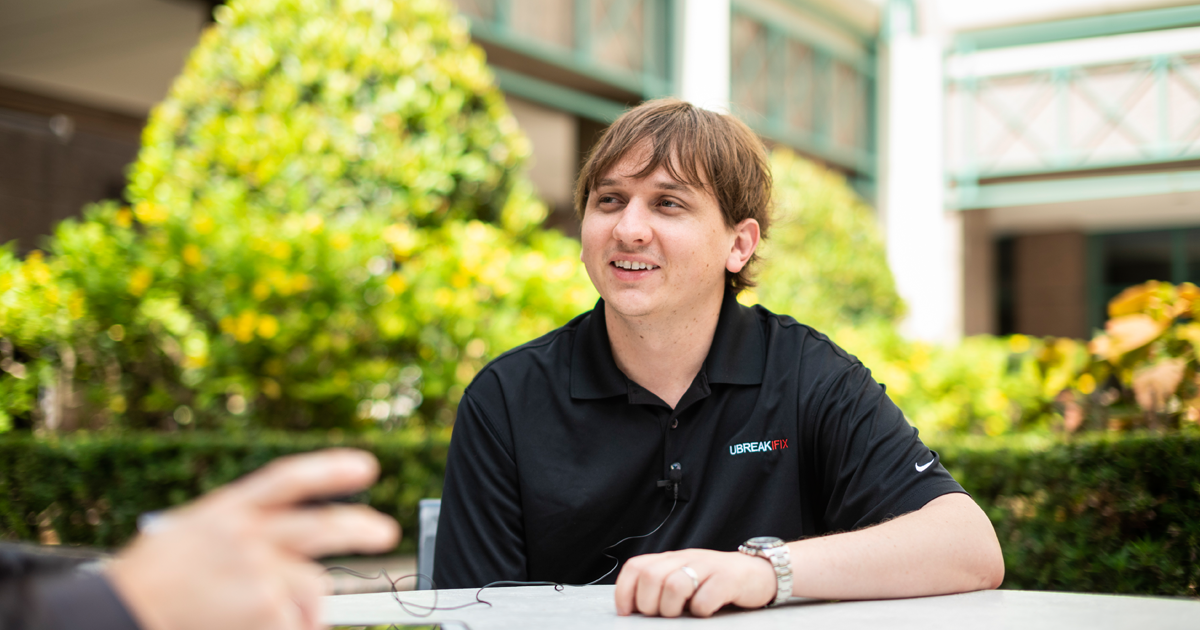
Dean: I love that you keep saying ‘this early in the ride’ because I have this philosophy about always coming into work having a ground floor mentality like you’re on the ground floor of something bigger. It’s kind of mind-blowing to see a company with nearly 500 stores still having that type of mindset. I think that’s probably a testament to a lot of your continued success.
Justin: Yeah, I don’t know if it’s unique to uBreakiFix, I haven’t been a part of a lot of other businesses, but it feels like no matter how hard we work or no matter how far we get along, business is always two steps forward, one step backwards, two steps forward, one step backwards. As soon as you start to get comfortable, reality has a way of putting you back in the chair and telling you to get to work.
I had intense dissatisfaction with corporate America.
Dean: I think I mentioned to you that I mentor lots of students, so if a mentee of mine was going to follow you around for a week, so everything Justin did, the mentee did, what would they learn from you?
Justin: Probably not much. [Dean laughs] They’d probably learn that I’m probably not as organized as they thought I would be. I probably don’t always make the best use of my time. I’m more in the weeds than most probably think and I’m constantly learning myself about the business and the people that I work with and how to be a leader in this business.
Dean: I think there’s a lot of humility wrapped into what you’re saying, so what I’m actually hearing is that they’re going to learn time management skills, problem-solving, …
Justin: Problem solving, that’s a good one. If I could say that I was good at one thing, it would be solving problems. I have an ability to see a problem and get to a very good resolution most often faster than I’d say the normal person and that is the beginning and the end of what I’m really good at. I’ve been able to use that ability a lot to help get me in this business to where we are.
Dean: Probably literally! Problem-solving as in fixing something in front of you. [Justin laughs] And it just kept scaling out.
Justin: Yeah, one problem at a time, that’s why it’s felt so natural, I guess.
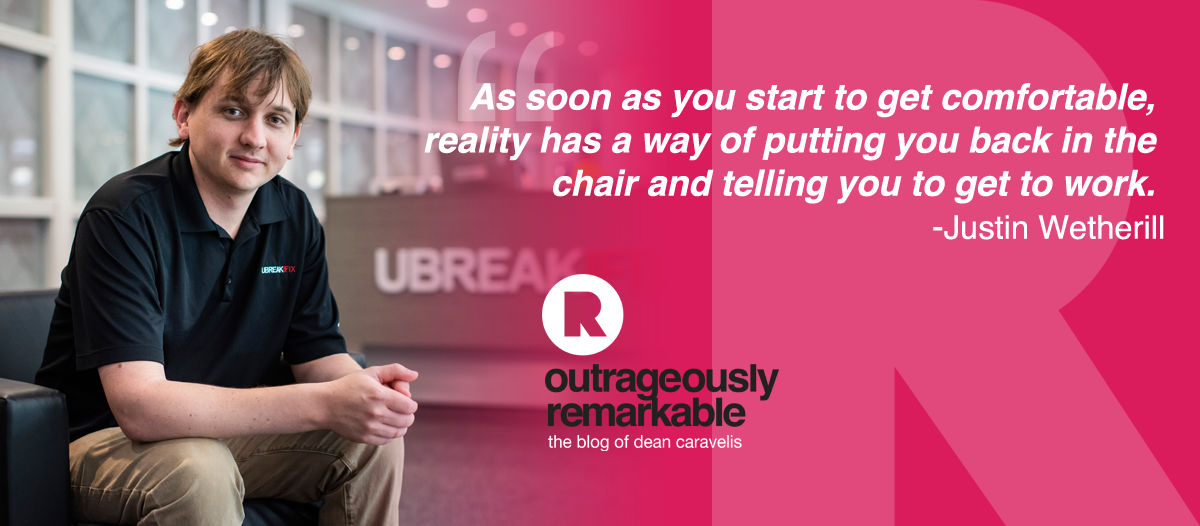
Dean: So if you didn’t break your phone many years ago and that led to these steps, what do you think you’d be doing professionally right now if you went the traditional route and just went to school, finished a degree, interviewed, and then went deep into your career? What do you think you’d be doing today?
Justin: That’s a tough question. So, I finished school, went to my career, worked in corporate America for 18 months or so, and then started uBreakiFix. I had intense dissatisfaction with corporate America.
Dean: What were you doing?
Justin: I did database design for Aon Hewitt, but I could not accept that no matter how hard you worked or what you were able to accomplish in that time, it was going to take six years to get the corner office. That mindset just didn’t fit with me so I was going to find a way to be an entrepreneur and kind of blaze my own path. The phone breaking happened to be kind of what got it all started, but David and I tried things before this just trying to break out of the mold.
Dean: Okay. What was an example of something else that you guys tried?
Justin: We built computers, custom gaming computers and we sold them on eBay. A good bit of sales. We were going to make a t-shirt design company, which I think everybody who has started a business did at some point. We never even made a t-shirt. David made a website and we talked about it, but we never really made a product. So we were trying thing after thing and uBreakiFix was the third thing we tried and it happened to be really successful. We were going to keep trying, so I don’t know what I would have been doing. I certainly never thought that I’d be fixing things. I’m not even the type of guy who likes fixing things. For us, it’s not about the physical repair, it’s more about what we’ve been able to do with the model and all that.
We signed Samsung, everybody knows.
Dean: Is there something 100% true about you that let’s say most people in this building that you work with would not believe?
Justin: 100% true that most people don’t know … I hope not. I’m a pretty transparent person, arguably too transparent and too honest, so I’d be surprised if there was much that the people I work with didn’t know about me.
Dean: I think transparency is one thing that we discuss a lot in a CEO group I am in and it’s one thing that it’s always coming up, how transparent you are with your team. When you say ‘too transparent,’ what do you mean by that? How transparent are you with your team regarding the company?
Justin: Yeah so, to me, being transparent and communicating well are kind of two different things. I have no problem being transparent in that this is what we set out to do, this fell short, this is my responsibility, this is what we can all do better next time to fix it. To me, that’s kind of being transparent. Sometimes, too transparent is that I don’t wait to give feedback about how I feel about a certain thing. Or I may be in the wrong environment to give feedback to a certain team member or something like that rather than being encouraging. And communication, I think the second part of that like you mentioned, a lot of exciting things have been happening at uBreakiFix over the last nine years so we haven’t had the need to proactively communicate. You know, we get 400 stores, there’s a news article about it, everybody kind of knows. We signed Samsung, everybody knows. There’s not a lot of secrets to be held back, but we did just start company all-hands monthly meetings to kind of go through the state of the business. What’s going right, what’s going wrong. That’s new, so we have a long ways to go on communicating, but most would say we’re super transparent if that makes any sense.
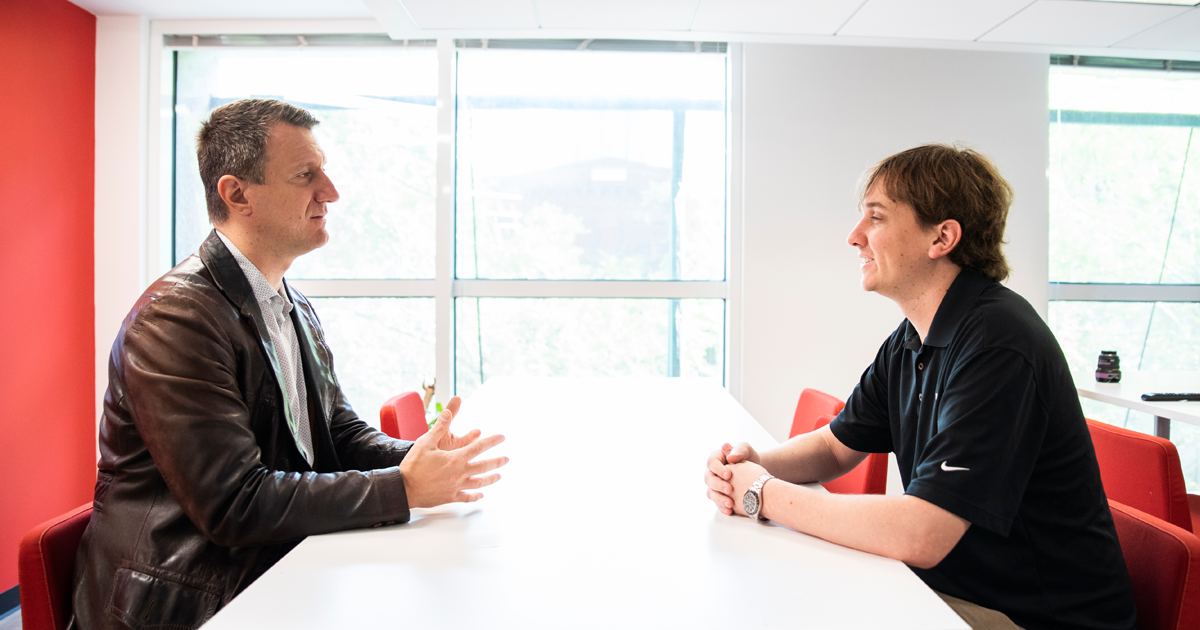
Dean: How would you describe your leadership style?
Justin: Fast and loose. I expect a lot out of myself and I expect a lot out of those that I have the opportunity to work with. I’m not a micromanager. We’ll work together to set out a vision and check on status with certain stakeholders, but I’m not the guy who is calling you every day to ask you how your role is going. I’m more the guy that we get to the end of the quarter and we talked two months ago about all the stuff that we were going to do and none of it’s done and then we’re having a hard conversation.
… I think that was an eye-opening read for me
Dean: I think we talked about reading when we met last time. Is there any book or books that you’ve read that have changed the way you think about business that would be worth sharing?
Justin: I think Conscious Capitalism, which was written by John Mackey, the CEO of Whole Foods, was a fantastic book and goes into how a company like GE was run versus how a company like Whole Foods was run, kind of more socially responsible. Rather than just saying it and feeling all good about it, it goes into the financial performance of the two and how they compared and kind of how socially responsible companies performed against less socially responsible companies over time. I think that was an eye-opening read for me early on in my journey here at uBreakiFix.
Dean: Aside from helping to maintain phones instead of having to buy new ones are there any other socially responsible initiatives that you all champion at the company?
Justin: We actually break that down to the department level, so one of our key objectives for this year was for every department to spend some time every quarter with the charity of their choice, whether it be giving back their time and then also financially. Rather than picking a cause for the entire company, we left it up to each department to make the decision about what meant something to them and then to go out and do that every quarter.
Dean: That’s awesome. So, you’re going to have to get rid of the humility for a second here because this is a question that I ask where I want people to look at themselves in the third person, but what would you say is your secret to being an outrageously remarkable entrepreneur?
Justin: Finding a niche, which we stumbled upon, and then surrounding yourself with likeminded people who are passionate about the business and desire to see it as successful as you do. I mean, to have people on the team that take ownership of the company even though they don’t own it. You talk to anybody who runs any business, whether it be big or small, it always comes down to the people. There’s only one of me and I can only do so much, but fortunately, we have a great team that’s been able to propel this to heights I never imagined.
____________
Want to keep up with this blog? GREAT! Subscribe here to be an insider.
Learn more about uBreakiFix and franchising opportunities on its website.
Pictures of this interview taken by Nick Leyva, check out his work!